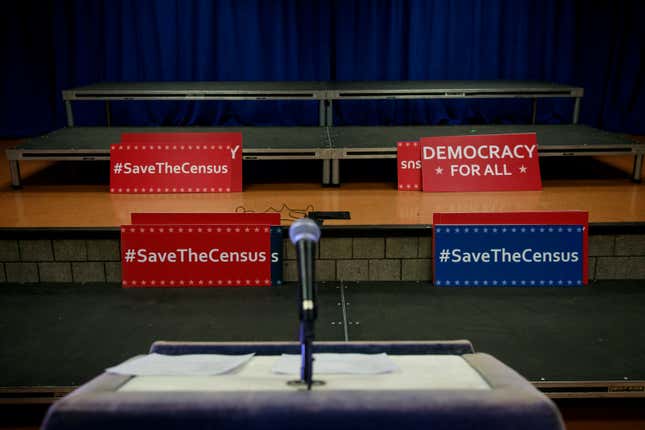
The NAACP, in a lawsuit filed against the U.S. Census Bureau last Friday, is alleging the federal government is unprepared to accurately count America’s black residents—an issue that could result in political disenfranchisement and billions of dollars in losses for black and brown communities.
The suit, filed alongside Prince George’s County, one of the country’s most prosperous majority-black counties, calls the agency’s preparation efforts “conspicuously deficient,” explaining that it doesn’t currently have enough workers to ensure an accurate count, reports the Associated Press. Not enough field offices have been opened, nor has the agency done enough testing on its online form, the NAACP claims. In 2020, for the first time in Census history, the bureau is encouraging respondents to answer the survey online.
“These deficiencies will result in a massive and differential undercount of communities of color,” read the lawsuit. “Such a dramatic undercount will especially dilute the votes of racial and ethnic minorities, deprive their communities of critical federal funds, and undervalue their voices and interests in the political arena.”
The Census, which determines how an estimated $1.5 trillion in federal dollars will be spent has also historically undercounted communities of color, particularly black communities. Experts estimate that the high-stakes survey will undercount about 1.7 million black people—costing states $3.4 billion a year. One recent survey found black Americans are twice as likely as their white peers to not participate in the Census.
Georgia politician Stacey Abrams has made accurate representation a core issue of her advocacy efforts following her devastating and contested loss in the state’s gubernatorial race last year, founding the nonprofit Fair Count to tackle the issue. An accurate Census count can prevent political gerrymandering by ensuring that congressional districts are fairly represented, she’s said. But it also has widespread consequences for quality of life and access to local resources.
“Here’s what [an inaccurate count] translates into,” Abrams said at a reproductive justice conference in October 2019. “The money that pays for hospitals, that pays for affordable housing…If our people are not counted, they literally do not receive the resources necessary. And as a consequence, we have weaker infrastructure, we have terrible hospitals, we have doctor shortages, we have overcrowded schools. All of those things happen because of the Census.”
“When we are not counted, we do not count,” Abrams later told The Root. “And when we do not count, we do not improve our communities.”
The high-stakes survey has also been steeped in additional controversy for the last few years over concerns about a citizenship question (no Census survey has posed this question since 1950) that ultimately wasn’t added. Supported by Trump’s Department of Justice, the citizenship question raised fears that the information would be used to target undocumented immigrants and lead to an undercount of Latinx people living in the country.
At one point, a new Middle Eastern/North Africa category for race and ethnicity was considered for this year’s Census but was ultimately shot down after the bureau cited a need for more testing.
The agency has hired 500,000 people to help administer the Census in 2020. The number is lower than their 2010 headcount because the bureau will rely more on mobile outreach and digital data collection, it says.
Most American residents can expect to start filling out the survey in mid-March.

